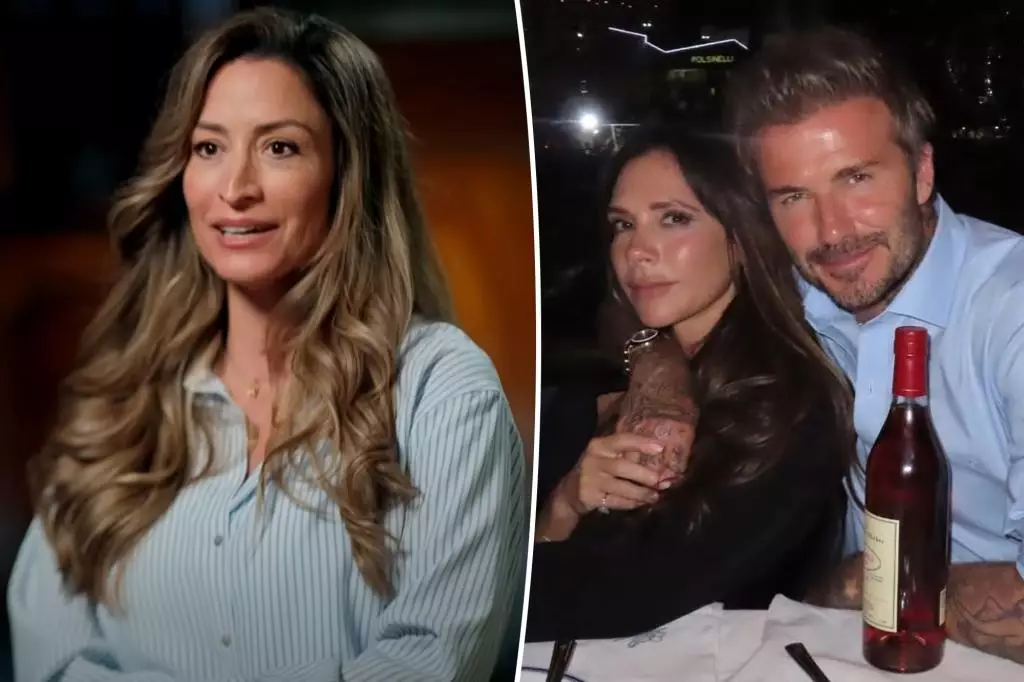The narrative surrounding Rebecca Loos and David Beckham continues to captivate audiences two decades after it first made headlines. With the release of the Netflix docuseries “Beckham,” which revisits the tumultuous arc of their alleged affair, both old and new perspectives collide. Despite Beckham’s steadfast denial of any wrongdoing, Loos’s recent interview on “60 Minutes Australia” opens a Pandora’s box of complex emotional responses and societal implications that go well beyond mere celebrity gossip.
Body language expert Judi James shed light on Loos’s demeanor during the interview, suggesting that her emotional attachment to Beckham remains palpable. Notably, Loos’s use of the present tense when discussing Beckham hints at a nostalgia—or perhaps an unresolved emotional connection—that many may not have expected. Her mannerisms, including the way she recounted conversations from years gone by, suggested a mind still preoccupied with past affections, making one question whether closure has really been achieved.
Analyzing Body Language: The Subtle Yet Telling Signals
James’s observations delve deep into the nuances of human interaction, illustrating how our physical expressions often betray deeper sentiments. Loos’s apparent vulnerability—emphasized by her minimal makeup and emotional admissions—paints a picture of someone conflicted between empowerment and remorse. As she referenced feelings of “darkness” and “loneliness” during her interview, one cannot help but wonder if this admission is both a cry for validation and an attempt to reclaim her narrative.
Her mention of the challenges of standing up against the “strongest, most powerful couple in the media” echoes a larger social commentary on the courage it takes to speak out, even when the odds seem stacked against you. In essence, Loos’s journey embodies the struggle of many who have found themselves on the periphery of public scrutiny, each seeking their own form of recognition amid the dizzying whirlwind of fame and fortune.
The Emotional Cost of Fame
Victoria Beckham, in the same docuseries, voiced her own recollections of this fraught period, characterizing it as one of deep emotional turmoil. Her admission that it was “the hardest period because it felt like the world was against us” resonates profoundly, not merely for the Beckhams, but for anyone contending with public life. The pressures exerted by fanfare, paparazzi, and public speculation have a unique way of unraveling even the seemingly strongest bonds.
While David Beckham has consistently brushed aside the allegations, claiming they are untrue, the ripple effect on his marriage and family life is impossible to ignore. The emotional strain reflected in Victoria’s words indicates that the wounds inflicted by scandal run far deeper than mere headlines suggest. Loos’s insistence on the truth of her claims appears less about seeking vengeance on the Beckhams and more an endeavor to assert her own narrative within a landscape that seemed to overshadow her voice.
The Dichotomy of Bravery and Social Stigma
Loos’s self-proclaimed status as “brave” for standing up against a couple perceived to be untouchable speaks volumes about societal perceptions of truth and power dynamics in the media. While some view her actions as opportunistic seeking of attention, others may recognize a legitimate attempt to reclaim agency. The media frenzy surrounding the affair lent an air of sensationalism, often reducing personal narratives to scandalous soundbites.
In her reflections, Loos has asserted that she “never exaggerated” her experiences, and this begs the question: how often do we conflate truth with perception in the era of social media? In a world where one’s character can be scrutinized through a filtered lens, the struggle for authenticity becomes central to anyone caught in a similar storm.
Ultimately, the ongoing saga of Rebecca Loos and David Beckham continues to highlight broader themes of love, betrayal, and the relentless pursuit of one’s truth, long after the original scandal has faded from the public consciousness. The intertwining of personal experience with media spectacle morphs into a discourse on the human condition itself—illustrating how our frailties and victories can shape the narratives we choose to tell, or those thrust upon us.

